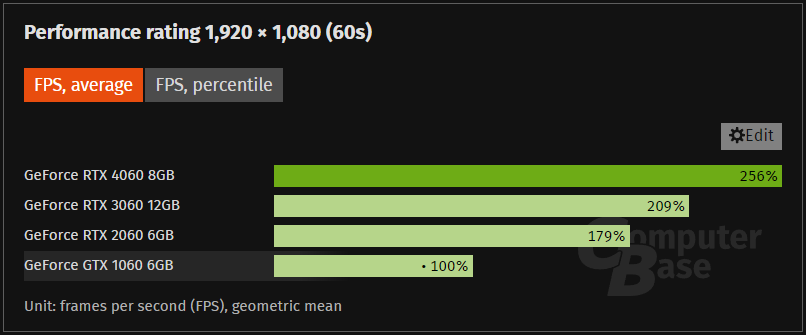ComputerBasere-tested four generations of Nvidia GTX/RTX xx60 series GPUs, among thebest graphics cards, to see the performance difference between each GPU in today’s modern games. The German tech review outlet discovered that the generational leap of the RTX 2060 was by far the greatest, with the Turing GPU outperforming the GTX 1060 by 79% on average. ComputerBase also discovered that the RTX 4060’s 8GB memory size handicaps its performance in several modern titles.
The German publication’s results are normalized to 100% of the GTX 1000 series. The relative performance improvement is compared to the previous generation. The most significant generational improvement of the four cards comes from the RTX 2060, which offers a whopping 79% improvement compared to the GTX 1060. This was the average performance gap discovered in the twelve titles it tested.

The next most considerable generational improvement comes from the RTX 4060, but it is nowhere near what the RTX 2060 delivers. The RTX 4060 is only 22% faster than the RTX 3060 12GB, primarily because of the RTX 4060’s 8GB VRAM capacity. Finally, ComputerBase found the lowest generational improvement with the RTX 3060, just 17% faster than the RTX 2060 average.
TheGTX 1060was the second to last xx60-series card from Nvidia to come with the GTX branding and thus no hardware-accelerated ray-tracing capabilities (or DLSS). The GPU came with Nvidia’s Pascal GPU architecture, rocking 1280 CUDA cores, 10 SMs, and 8GB of GDDR5 memory operating on a 192-bit wide bus. TheRTX 2060was the first Nvidia GPU with hardware-accelerated ray tracing and AI-tensor cores (for powering things such as DLSS upscaling). The GPU was built on Nvidia’s Turing architecture, sporting 1,920 CUDA cores, 30 SMs, 30 RT cores, 240 Tensor cores, and 6GB of GDDR6 memory operating on a 192-bit bus.

TheRTX 3060 12GBwas the second xx60-class Nvidia GPU with RT and AI-accelerated hardware. The GPU was based on Nvidia’s Ampere architecture, featuring 3,584 CUDA cores, 28 SMs, 112 Tensor Cores, 28 RT cores, and 12GB of GDDR6 operating on a 192-bit bus. TheRTX 4060is Nvidia’s latest-generation xx60 series product, sporting its Ada Lovelace GPU architecture, 3,072 CUDA cores, 24 SMs, 96 Tensor Cores, 24 RT cores, and 8GB of GDDR6 operating on a 128-bit bus.
The per-game analysis makes the RTX 2060’s huge performance gap to the GTX 1060 even more apparent. InDiablo II: ResurrectedandDoom Eternal, the RTX 2060 was 226% and 86% faster than its Pascal predecessor. InHorizon Zero Dawn, the RTX 2060’s immense performance enabled the card to achieve over 60 FPS, while the GTX 1060 couldn’t even reach 45 FPS.Rachet and Clank: Rift Apartis the worst offender for the GTX 1060, with the RTX 2060 offering playable performance at 52.9 FPS and the GTX 1060 offering unplayable performance at 26.3 FPS.

However, things get complicated regarding the RTX 3060 and RTX 4060 analysis, thanks to the vast VRAM difference between the two GPUs. In games where VRAM isn’t an issue, the RTX 4060 has the advantage, often outperforming the RTX 3060 by around 30%. But inRachet and Clank: Rift Apart, the game’s insatiable demand for VRAM overwhelms the RTX 4060, enabling the RTX 3060 12GB to match the RTX 4060 average frame rate. However, in actual playability, the RTX 3060 far outperforms the RTX 4060, offering nearly twice the 1% percentile performance. This means the RTX 4060 is succumbing to hitching or micro stutter, while the RTX 3060 is unaffected.
Get Tom’s Hardware’s best news and in-depth reviews, straight to your inbox.
ComputerBase’s results reveal that the RTX 2060 6GB has had a surprisingly good lifespan since it debuted in 2018. The architectural changes Nvidia made in RTX 2060 have played off exceptionally well, enabling the GPU to perform surprisingly well in non-VRAM-intensive games and be close to the RTX 3060. On top of this, it also hasDLSSsupport, allowing the owners to extract even more performance from the RTX 2060.
However, the same cannot be said of the RTX 4060. Despite being released just a year ago, the RTX 4060 has problems with some modern titles thanks to its VRAM reduction compared to the previous generation. We can only expect this problem to escalate as games become more VRAM-intensive.
Aaron Klotz is a contributing writer for Tom’s Hardware, covering news related to computer hardware such as CPUs, and graphics cards.